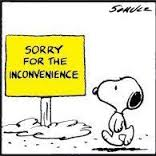Dear Dr. Morgan: I’m writing to let you know that I won’t be in class today at 11:30. Our lacrosse match on campus that was scheduled for yesterday was rescheduled for today at 3:30. Our pre-game prep starts at 12:00, so I won’t be able to make class. I know that I have already missed a couple of classes this semester [four, as a matter of fact], but I’m hoping this won’t be a big problem.  My academic advisor’s email address is [email protected] if you have any questions. Sorry for the inconvenience.
My academic advisor’s email address is [email protected] if you have any questions. Sorry for the inconvenience.
Dear Dr. Morgan: I’m very sorry, but I won’t be able to make Friday morning seminar. I’m in a wedding on Sunday back home; I had a Friday afternoon flight home, but my mother changed it to Thursday afternoon because she was able to find a better fare on that day. I’ll contact you next week to see if there’s anything I need to make up. Sorry for the inconvenience.
My response to each of the above student emails that I received last week was something along the lines of “Dear Student: It is your responsibility to do whatever is necessary to account for missed classes (check the syllabus for the course policy on attendance)—you are also responsible for whatever we work on in the class that you miss. Your missing class is not an inconvenience to me at all—the inconvenience is entirely yours. Dr. Morgan.”
In student/teacher communication, “Sorry for the inconvenience” has become the “go to” email comment with which to close a communication containing information that you don’t want to take responsibility for.  The sender is saying “I hope that maybe a half-hearted apology for making your life difficult will cause you to be merciful, even though I know that you don’t have to and that I should have handled the situation differently.” On the level of effectiveness, the “sorry for the inconvenience” strategy ranks just slightly above the ostrich strategy which requires pretending that the situation never even happened. Used more broadly, “sorry for the inconvenience” could mean “I know what I just did or failed to do messed your day (week, month, year, life) up. That doesn’t mean that I’m going to do anything about it or try to set things right—but I wanted you to know that I am aware of the inconvenience I just caused you.” Sort of like “I just wrecked your car—sorry for the inconvenience,” or “I am sleeping with your significant other—sorry for the inconvenience.”
The sender is saying “I hope that maybe a half-hearted apology for making your life difficult will cause you to be merciful, even though I know that you don’t have to and that I should have handled the situation differently.” On the level of effectiveness, the “sorry for the inconvenience” strategy ranks just slightly above the ostrich strategy which requires pretending that the situation never even happened. Used more broadly, “sorry for the inconvenience” could mean “I know what I just did or failed to do messed your day (week, month, year, life) up. That doesn’t mean that I’m going to do anything about it or try to set things right—but I wanted you to know that I am aware of the inconvenience I just caused you.” Sort of like “I just wrecked your car—sorry for the inconvenience,” or “I am sleeping with your significant other—sorry for the inconvenience.”
 Human beings do not like being inconvenienced. Although we might not admit it, we love “convenience stores” and have made them a ubiquitous part of the American landscape, simply because they are “convenient.” Early in the 2000s, shortly after the Supreme Court decided to appoint George W. Bush as the 43rd President of the United States, Al Gore wrote a book as well as both starring in and producing a documentary about the dangers of global warming with the wonderful title “An Inconvenient Truth.” I have often wondered why millions of people worldwide, but particularly in this country, are so vehement in either their denial that global warming is real or in their insistence that if it is real, human beings are not responsible, given the mountains of evidence and data that prove its reality and our complicity.
Human beings do not like being inconvenienced. Although we might not admit it, we love “convenience stores” and have made them a ubiquitous part of the American landscape, simply because they are “convenient.” Early in the 2000s, shortly after the Supreme Court decided to appoint George W. Bush as the 43rd President of the United States, Al Gore wrote a book as well as both starring in and producing a documentary about the dangers of global warming with the wonderful title “An Inconvenient Truth.” I have often wondered why millions of people worldwide, but particularly in this country, are so vehement in either their denial that global warming is real or in their insistence that if it is real, human beings are not responsible, given the mountains of evidence and data that prove its reality and our complicity.  The title of Gore’s documentary and book directly answers such questions—people often go to extremes in their efforts to avoid anything that, if accepted as true, would force them to adjust their attitudes and actions in uncomfortable ways. I’m reminded of what Vera Brittain once said that teachers should never forget—learning is an uncomfortable process and “above all, human beings desire to be comfortable.” In addition, above all they desire not to be inconvenienced.
The title of Gore’s documentary and book directly answers such questions—people often go to extremes in their efforts to avoid anything that, if accepted as true, would force them to adjust their attitudes and actions in uncomfortable ways. I’m reminded of what Vera Brittain once said that teachers should never forget—learning is an uncomfortable process and “above all, human beings desire to be comfortable.” In addition, above all they desire not to be inconvenienced.
Which is what makes a familiar gospel reading from Mark so problematic. In response to Peter’s insistence that he is not going to go to Jerusalem to die, Jesus first puts Peter in his place in Jesus’ inimitable style, then issues this attractive invitation to his would-be disciples:
If any want to become my followers, let them deny themselves and take up their cross and follow me. For those who want to save their life will lose it, and those who lose their life for my sake, and for the sake of the gospel, will save it.
To which Jesus might have added, Sorry for the inconvenience. Because what Jesus is describing is more than an inconvenient truth. He’s warning his would-be followers then and now that, as  Dietrich Bonhoeffer wrote, “When Christ calls a man, he bids him come and die.” That’s an inconvenient faith.
Dietrich Bonhoeffer wrote, “When Christ calls a man, he bids him come and die.” That’s an inconvenient faith.
There is another story in Mark’s gospel that caught my attention in one of my first posts on this blog almost two and half years ago. A young man (called a “certain ruler” in the Luke version of the story) approaches Jesus and asks “What shall I do that I may inherit eternal life?” Jesus answers that the young man knows very well what to do—he should keep the commandments, listing a few for the guy just in case he had forgotten them. But the young man replies “Teacher, all these I have done from my youth.” He’s not looking for a “good boy” pat on the head from Jesus; he’s already past the point of thinking that simply following the rules is good enough, or he wouldn’t have asked in the first place. The young man is looking for more.
We all know Jesus’ response—he tells him the inconvenient truth. “Go your way, sell whatever you have and give to the poor, and you will have treasure in heaven; and come, take up the cross, and follow me.”  We also all know the end of the story—“He was sad at this word, and went away grieved, for he had great possessions.” Jesus had inconvenienced the rich young man beyond his toleration level. But what precedes Jesus’ sharing this inconvenient truth is very interesting. Mark says that “Jesus, looking at him, loved him.” This is a man who wants more, Jesus knows it, and Jesus loves him for it. But this is an inconvenient faith—the thing that you cannot do, that’s the thing that is required. And it will be something different for each of us. This story isn’t about the incompatibility of wealth and following Jesus at all. It’s a story about being called to come and die. The God of love is not a cure for anything. The God of love is the greatest of dispensers of inconvenience. “I did not come to bring peace but a sword,” and this is a sword that cuts deepest in those who are the most obsessed with knowing God.
We also all know the end of the story—“He was sad at this word, and went away grieved, for he had great possessions.” Jesus had inconvenienced the rich young man beyond his toleration level. But what precedes Jesus’ sharing this inconvenient truth is very interesting. Mark says that “Jesus, looking at him, loved him.” This is a man who wants more, Jesus knows it, and Jesus loves him for it. But this is an inconvenient faith—the thing that you cannot do, that’s the thing that is required. And it will be something different for each of us. This story isn’t about the incompatibility of wealth and following Jesus at all. It’s a story about being called to come and die. The God of love is not a cure for anything. The God of love is the greatest of dispensers of inconvenience. “I did not come to bring peace but a sword,” and this is a sword that cuts deepest in those who are the most obsessed with knowing God.
These gospels are “hard sayings” because they run roughshod over our desire that our dealings with what is greater than us be similar to a convenience store transaction. “What do I need to do in order for X to happen, in order for Y not to happen, in order for Z to get a break?” are the sorts of questions we so often want answered, but they are always wrong sort of question when directed toward the transcendent. While on sabbatical several years ago I heard the poet  Michael Dennis Browne speak of an insight that unexpectedly came to him as he mourned the tragic death of his younger sister, a woman for whom family and friends had gone hoarse with their prayers and petitions for healing. And she died anyways. What the hell is going on? Browne said “It came to me that this is not a God who intervenes, but one who indwells.” That changes everything. The inconvenience of trying to believe in a God who never calls, writes, or tweets is transformed into the challenge of being God in the world.
Michael Dennis Browne speak of an insight that unexpectedly came to him as he mourned the tragic death of his younger sister, a woman for whom family and friends had gone hoarse with their prayers and petitions for healing. And she died anyways. What the hell is going on? Browne said “It came to me that this is not a God who intervenes, but one who indwells.” That changes everything. The inconvenience of trying to believe in a God who never calls, writes, or tweets is transformed into the challenge of being God in the world.












